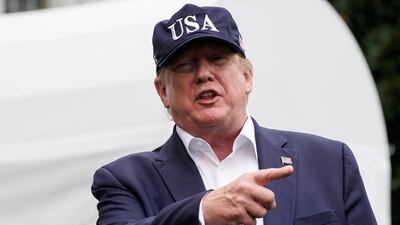US President Donald Trump is to meet Defence Secretary Mark Esper on Tuesday to discuss a draft deal with the Taliban that could lead to Washington’s withdrawal from Afghanistan.
Mr Trump is due to meet Mr Esper in the evening, and a US defence official told The National Afghanistan would be part of the discussions.
On Monday night, US envoy to Afghanistan Zalmay Khalilzad, who is in Kabul after the ninth round of US-Taliban talks in Qatar, told Afghan news channel ToloNews that an agreement had been made “in principle”.
Mr Khalilzad said the deal would see the US withdraw 5,400 troops from five bases in Afghanistan in 135 days. But he cautioned that nothing was final until Mr Trump agreed to it.
Mr Trump is keen to end the US’s longest-running war and fulfil a campaign promise to withdraw the country’s 14,000 troops.
But security concerns have slowed progress over the past two years, and his insistence on the deal prompted James Mattis to resign as defence secretary last December.
It is unclear if Mr Esper is on board with the plan, but National Security Adviser John Bolton has been sidelined from the meetings because of his opposition to the approach, The Washington Post reported.
However, Mr Esper signalled support last week while standing alongside Gen Joseph Dunford, Chairman of the Joint Chiefs of Staff.
“When I think about Afghanistan, I think about two things," Gen Dunford said.
"Number one is we don't want Afghanistan to be a sanctuary from which the homeland can be threatened, and the other is that we want peace and stability in Afghanistan for the Afghan people."
But he said the need for inter-Afghan dialogue was a critical part of any settlement.
Faisel Pervaiz, an analyst at the US intelligence company Stratfor, described Washington’s strategy as “aiming for progress, not perfection” in seeking an exit from the war.
"Though details on yesterday's draft peace deal are scant, we can infer that the US will embark on a phased drawdown from the conflict tied to the Taliban's commitment to upholding its part of the agreement, including a ceasefire," Mr Pervaiz told The National.
“There are no risk-free options in terms of US troop withdrawal from Afghanistan."
Mr Pervaiz said the gradual, phased aspect of the plan would "give the US the opportunity to assess if the Taliban are exploiting the security vacuum or not, and whether a further drawdown is warranted".
But he said that the agreement put Afghan President Ashraf Ghani's government in a difficult position.
“Publicly, he must project a posture of strength," Mr Pervaiz said. "But privately, he is doubtless aware that the gradual withdrawal of US support makes his security forces more vulnerable."
The US invaded Afghanistan after the September 11, 2001, terrorist attacks that were launched from the country, which was then ruled by the Taliban.

